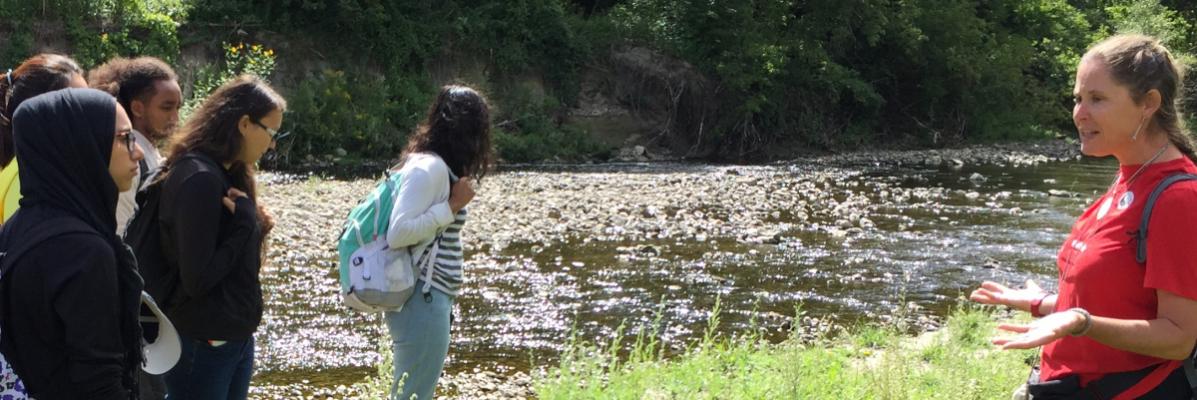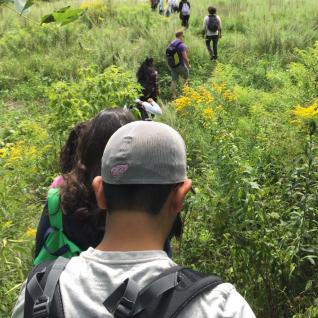Conservation and Biodiversity Major (HBSc)
Admissions Category: Life Sciences
Are you a prospective student applicant?
You can enter the Health Sciences Stream to accelerate your career in a health care profession

Program Overview
The Conservation and Biodiversity programs provide a foundation for understanding how ecology and evolution shape organismal features and the structure and function of communities and ecosystems. Topics covered range from the structure and function of ecosystems to the evolution of behaviour, morphology, and physiology. These programs will show how ecological and evolutionary perspectives can be used to understand and predict the outcome of dynamic interactions among organisms, populations, species, and communities. Students will be: well trained to take positions in government agencies, consulting firms or NGO’s; able to continue graduate studies in science for academic careers; able to pursue careers in business or law related to environmental issues, stewardship and sustainable development.
Complementary Programs:
Specialist: Not applicable. Major: Environmental Science and International Development Studies programs.
Check out future career opportunities and skills acquired from completing this program:
Competencies & Skills
- Explore how organisms interact with the environment
- Conduct and design experiments
- Observe and make measurements on organisms
- Inspect specimens
- Collect, analyze and interpret data
- Utilize laboratory equipment
- Make projections from data
Careers for Graduates
- Conservation Officer in Government Services (TRCA, Parks Canada, Toronto Zoo, Oceans and Fisheries, ROM, etc.)
- Careers in the Ministry of Natural Resources
- Environmental Consultant in NGO’s (The Nature Conservancy, Ontario Nature, David Suzuki Foundation)
- University Researcher
- Lab Technician in Industry
Further Education
- Graduate Studies
- Public Policy
- Environmental Science
- Sustainability
- Law School
- Teacher Education
- Medical School
- Project Management
- Energy Management
- Environmental Technology
Program Pathway
Year 1 | Year 2 | Year 3 | Year 4Choose Your Courses Wisely
- 1.0 Biology credit: BIOA01H3, BIOA02H3.
- 1.0 Chemistry credit: CHMA10H3, CHMA11H3 or CHMA12H3.
- 0.5 credit from MATA29H3 OR MATA30H3 OR STAB22H3 or PSYB07H3.
- 0.5 Physics credit from: PHYA10H3, PHYA11H3.
- 0.5 Computer Science credit from: CSCA08H3, CSCA20H3.
- Use Degree Explorer and the UTSC Calendar to plan your degree.
Develop Your Academic & Research Skills
- Attend Biology Students Association (BioSA) BioAID Review Sessions for guidance with writing lab reports.
- Contact the UTSC Library for in-depth research assistance for your assignments; writing support is also available at the CTL Writing Centre.
Apply Theory to Practice
- Attend the Professor/Graduate Student Mix & Mingles to meet many of the professors & TAs you will encounter as you progress through your degree.
- Start building your Co-Curricular Record (CCR) and search for Experiential Learning and Work-Integrated Learning opportunities on the Career & Co-Curricular Learning Network (CLNx).
Become an Engaged Citizen (Locally & Globally)
- Join BioSA and ECO; attend their activities and events.
- Build confidence and self-esteem through Department of Student Life’s (DSL) LEAD program.
- Join UTSC Parks Canada Club; volunteer and go on their field trips.
- Volunteer with Campus Farm, Rouge Park, Toronto Zoo, Toronto Botanical Gardens.
Plan for Your Future Career
- Volunteer with organizations to explore your interest in industries related to your program of study; check listings on CLNx (>Jobs & Recruitment).
- Attend the UTSC Get Experience Fair in September or register with Scarborough Campus Student Union’s (SCSU) Volunteer Network Program.
Year 2
Choose Your Courses Wisely
- 3.0 credits of Biology Core courses: BIOB10H3, BIOB11H3, BIOB34H3, BIOB38H3, BIOB50H3, BIOB51H3.
- 0.5 credit of BIO Core Labs: BIOB52H3.
- BIOB90H3 Integrative Research Poster Project (CR/NCR 0.0 credit)
- Use Degree Explorer and meet with your Program Advisor to plan your courses and program.
Develop Your Academic & Research Skills
- Seek support from professors and TAs during office hours.
- Check the Research Catalogue on CLNx for possible research opportunities.
- Consider doing a directed research course (BIOB98H3).
Apply Theory to Practice
- Take part in BioSA's Conversation with Biologists, an event where students can interact with leading scientists and learn about their research and career trajectory.
- Consider Work Study (>Jobs & Recruitment>Work Study) for possible research opportunities.
Become an Engaged Citizen (Locally & Globally)
- Volunteer with Let’s Talk Science.
- Consider completing ISC’s Global Citizenship Certificate and look into their Global Learning opportunities.
- Join: Toronto Field Naturalists, Ornithological Club, Mycological Society.
- Volunteer: David Suzuki Foundation, UTSC Green Roofs, Cornell Birds, TRCA.
Plan for Your Future Career
- Gain experience by applying for a summer, part-time or Work Study position via CLNx (>Jobs & Recruitment).
- If you are considering grad school, speak to professors and program advisors early so you know what to keep in mind.
- Explore careers through AA&CC’s Job Shadowing and In The Field programs.
Year 3
Choose Your Courses Wisely
- 1.0 credit of Ecology & Evolution Foundation courses from: BIOC16H3, BIOC50H3, BIOC59H3, BIOC61H3.
- 4.5 credits of C- and D-level Ecology and Evolution courses and Organismal Biology courses; at least 1.0 credit must be at the D-level (see UTSC Calendar for specific course lists).
Develop Your Academic & Research Skills
- Consider entering the following Research Awards Contests: UTSC Library Undergraduate Research Prize, Mitacs Globalink, NSERC USRA, TD Undergraduate Research Opportunity Fellowship.
- Continue to build your volunteer and work experience.
- Consider directed research courses: BIOB98, BIOC99.
Apply Theory to Practice
- Continue to build on your skills and knowledge through relevant events offered through your department, student groups, DSL and the AA&CC.
- Consider being a peer reviewer for the Journal of Natural Sciences.
Become an Engaged Citizen (Locally & Globally)
- Attend Diversity in Medicine Seminar (for future medical students).
- Volunteer with DSL to be a First Year Peer Advisor. Consider other DSL activities such as intern with an NGO with the Queen Elizabeth II Diamond Jubilee Scholarship Program.
- Attend a Café Scientifique in your local community.
- Join: Toronto Field Naturalists, Ornithological Club, Mycological Society.
Plan for Your Future Career
- Speak with a staff member at the AA&CC to plan a potential career path.
- Check CLNx for networking events and employer information sessions.
- Attend the Graduate & Professional School Fair in September.
- Join a conference like TEDxUTSC or International Development Conference to develop professional skills.
Year 4
Choose Your Courses Wisely
- Consider taking a Senior Research course from: BIOD95H3, BIOD98Y3, BIOD99Y3.
- Ensure you have fulfilled your breadth requirements.
- Use Degree Explorer to ensure you are on track to graduate.
- Register your “Intent to Graduate” on ACORN by the deadline.
Develop Your Academic & Research Skills
- Apply for an Academic Travel Fund via DSL to research, present at a conference, or engage with the international academic community.
- Attend the weekly Biology Seminar Series (Fridays 12pm).
- Take upper-level directed research courses (BIOC99, BIOD98, BIOD95).
- Submit to UTSC’s Journal of Natural Sciences.
Apply Theory to Practice
- Participate in Ontario’s Synapse Life Science Competition
- Consider being an editor for the Journal of Natural Sciences.
Become an Engaged Citizen (Locally & Globally)
- Participate in the AA&CC’s Partners in Leadership program to learn and network with an alumni mentor about transitioning to work or further education.
- Consider joining the executive team of the UTSC Parks Canada Club; volunteer for their events and get to know people in your industry of interest.
Plan for Your Future Career
- Attend the AA&CC’s Get Hired job search conference in April/May.
- Attend the Jobs for Grads orientation for a job search “crash course”; find job opportunities on CLNx.
- If you are considering grad school, discuss your plans with staff at the AA&CC and your professors.
- Get your Personal Statement reviewed in the AA&CC.
